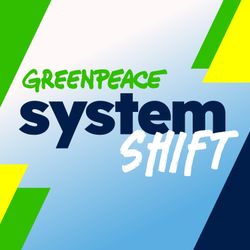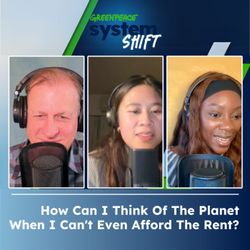Latest episode

10. NVIDIA just hit the $5 trillion milestone: who is paying the price?
31:00||Season 3, Ep. 10As Nvidia hits a $5 trillion market cap and the global race to build faster, smarter AI accelerates, communities in East Asia are bearing with the hidden consequences. In this bonus episode, host Joycelyn Longdon speaks with Katrin Wu from Greenpeace East Asia to uncover how AI supply chain is driving pollution, health risks, and rising emissions, in the attempt of catching up with increasing global energy demands.We hear from Sunryul Kim, a South Korean campaigner who filed a lawsuit against LNG Power Plants being built in his community and Lena Chang a campaigner from Taiwan, who tells us about the impact that the tech industry is having in her homeland.Even as the AI boom brings new pressures and environmental risks to communities in East Asia, there is hope. We can demand real power shifts and redistribution, to ensure those currently paying the unseen price are funded for a truly just transition.What can you do?Sign the petition for a clean, renewable AI supply chain - https://act.gp/4nyaBQrShare the episode to spark conversation about AI’s true footprintAdvocate for systemic changes in how the tech industry approaches climate responsibility - pushing for transparency, supplier support, and real investment in RE infrastructure where production happensRead Greenpeace reports for more information: Nvidia Ranks Last on AI Supply Chain Decarbonization (https://act.gp/3LR02uC), Tracking electricity consumption & emissions from AI chip manufacturing
More episodes
View all episodes

9. Can Change Happen in Our Lifetime? | Season 3 Review
02:25||Season 3, Ep. 9All episodes of Season 3 are now available! Two of our hosts, Joycelyn Longdon and Carl Schylter, reflect on what they’ve learned from our guests this season and how to move forward.And the answer is yes. “This is something that can happen in our lifetime and will happen if we all resist and if we continue to educate ourselves and engage in movements for alternative economic systems” - as Joycelyn points out in one of the episodes.Make sure to share your favourite episodes with your friends all over the world!SystemShift is also available on YouTube, with subtitles in Arabic, Chinese, English, French, German, Indonesian, Korean, Portuguese, and Spanish.
How Can I Think of the Planet When I Can't Even Afford Rent?
38:02|How can we talk about climate action when so many people are struggling just to get by? Why do the people least responsible for climate change often suffer the most from it? When paying the rent, finding a decent job, or putting food on the table are on the top of your concerns, climate change seems to be something for somebody else to solve. This is what we explore in the new episode of SystemShift, where Carl Schlyter and Joycelyn Longdon are joined by Nala Amirah, climate activist and founder of Green Welfare Indonesia.From rising rents to polluted neighbourhoods, they explain how low-income and marginalised communities often have no choice but to live in polluted areas that are at high risk from climate change—while those in power do little to fix the problem. But change is possible. Nala shares how community-led action, sustainable housing, and climate education are already making a difference—and why real solutions must come from the people most affected.As we wrap up this series, this episode asks: Do I have to worry about the end of the month or the end of the world?What can you do?It’s easy to feel like you’re not “doing enough” for the planet. But if you’re making any effort—however small—you’re already part of the solution. Here are some concrete things you can do:Ask governments to put wellbeing at the centre by signing the 'Wellbeing for All' petition: https://www.greenpeace.org/international/act/wellbeing-for-all/Urge governments to #TaxTheSuperRich now: http://greenpeace.org/international/act/tax-the-super-richCheck out your area and attend a community event or initiative. Chat with your neighbours and support local businesses.Consider volunteering for a cause you care about in a local group or organisation. It could be Greenpeace or any other you like!Maybe you can’t or are not able to do any of this. In that case, remember this words from Sarah Marques, a community leader from Recife, Brazil: “Our contribution is to live, to resist”.
7. Buses are Free for Women in Delhi: What Can the World Learn From That?
39:58||Season 3, Ep. 7What happens when public transport is made free for women? And how does mobility shape access to work, education, and safety?Hosts Yewande Omotoso and Carl Schlyter are joined by Nishant, a researcher and member of the Public Transport Forum Delhi, to explore the impact of Delhi’s fare-free bus policy for women.From improving gender equality to reducing emissions and easing urban congestion, they talk about how mobility is more than just getting from place to place, it’s about power, freedom, and inclusion. They discuss what the world can learn from this initiative—and whether other cities should follow. Nishant shares insights from his work on the Riding the Justice Route report for Greenpeace India, highlighting how accessible transport can drive social and environmental change.To commemorate International Women’s Day, this episode asks: How can free public transport create more equitable cities for women and a greener world for all?What can you do?If you live in India, share your thoughts on public buses with this 2-minute survey. Greenpeace India is on a mission to make public transport smooth, safe, and free, especially for women and transgender individuals.Read/share the Greenpeace Mobility VisionSupport change when it arrives If you live in an area with proposed changes to transport, like a new bicycle lane, or bus stop, be noisy about your support. Very often these changes, even small ones, get knocked down by oppositionSupport transport workers when they are struggling for better working conditions and for investment in public transport
6. How Can Islamic Principles Boost Climate Action?
43:56||Season 3, Ep. 6Can faith be a driving force in the fight against climate change? And how do Islamic principles shape environmental responsibility?Hosts Joycelyn Longdon and Yewande Omotoso, together with Tariq Al-Olaimy, Islamic Finance Advisor - Greenpeace MENA. Whether you are part of the 84% of the world’s population who identify with a religious group, or not, we all can learn from this conversation.From the ethical foundations of Islamic finance to the principles of environmental responsibility in Islam, they discuss how religious values can inspire sustainable practices, equitable economies, and collective care for the planet. Tariq shares insights on why integrating faith-based approaches is essential for building a just and effective climate movement.As Ramadan begins, this episode asks: Can faith-driven solutions help create a more sustainable world?What can you do?Here are some concrete things you can do: Share this podcast! The video version on YouTube is subtitled in Arabic, Bahasa and other languages. Learn more about Islamic Finance by visiting the Ummah for Earth website, where you can join as an individual or as an organisation.Download, read and share with friends and family, the “Islamic Finance and Renewable energy report” to know more about the sector and its potential to increase investments into renewable energy as a climate action tool.Listen to the Podcast for Earth, an initiative by Greenpeace MENA and The Arab Youth Green Voices Network that highlights issues related to Faith and the environment, Islamic values and protecting Earth, youth and the climate movement.
5. Does the Colour of Your Skin Make You More Vulnerable to Climate Change?
37:47||Season 3, Ep. 5How do race, gender, and economic status shape climate vulnerability? Why are marginalised communities often hit the hardest by climate disasters? Hosts Joycelyn Longdon and Carl Schlyter are joined by Mateus Fernandes, a young climate activist from the favelas of Guarulhos, São Paulo, and Lali Fernando Riascos, an Afro-Colombian youth leader and content creator from Guapi, Colombia. Together, they explore the intersection of systemic inequality and the climate crisis.From the disproportionate impacts of extreme weather to the exclusion of frontline communities from climate policy, they discuss why adaptation efforts must center those most affected. Mateus and Lali share their experiences of advocacy, resilience, and the urgent need for climate action and social justice.Released on the World’s Day of Social Justice (20th of Feb) and as we see disasters caused by extreme weather all over the world, this episode asks: How do we ensure that the most vulnerable communities are at the center of our climate adaptation efforts? What can you do? These are some concrete steps you can take for Climate Adaptation:Share this podcast! The video version on YouTube is subtitled in multiple languages.Sign the Greenpeace Brazil petition to demand governments and decision-makers to take decisive action for climate adaptation.Check your area or city's climate adaptation plans and demand local decision-makers to take action and prioritise the voices and needs of the most marginalised.Maybe you can implement your own adaptation measures. It can start by protecting your house, planting trees, or even connecting with your neighbours.
4. How Could Climate Change Reshape Jobs and Workplaces?
39:37||Season 3, Ep. 4What does a fair, green economy really look like? And what happens to the millions of people who work in extractive industries? Hosts Carl Schlyter and Yewande Omotoso are joined by Rhoda Boateng, Program Coordinator at the International Trade Union Confederation, to explore how the climate crisis is transforming jobs and workplaces worldwide.Unemployment is a global concern—but the solution isn’t in exploitative industries. From retraining fossil fuel workers to empowering local communities, Rhoda shares how we can shift from harmful, unsustainable models to creating decent, green jobs that prioritise both people and the planet.In a world where the climate crisis and the economy seem to be pulling in opposite directions, this episode asks: How could climate change reshape jobs and workplaces?What can you do?These are some of the things we can do to influence a Just Transition:Share this podcast! The video version on YouTube is subtitled in multiple languages.Read the report “Beyond Extractivism: Toward a Feminist and Just Economic Transition in Morocco and Egypt”, by MENA Fem and Greenpeace MENA: https://www.greenpeace.org/mena/en/beyond-extractivism-towards-a-feminist-and-just-economic-transition-in-morocco-and-egypt/Join a unionParticipate in public consultations when available Advocate for renewable and nature-based solutions Speak up for transparent and inclusive processes